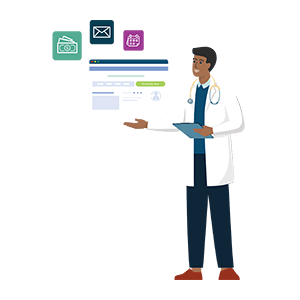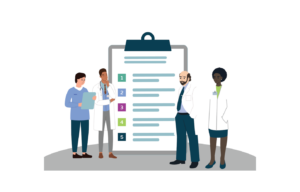3 Ways Orthopedic Practices Increase Collections With Less Staff Involvement

By Chloe From Clearwave | August 19, 2024
Orthopedic practices face unique challenges in managing collections due to rising costs, complex insurance processes and increasing patient financial responsibility. By leveraging innovative technologies and streamlined processes, orthopedic clinics can boost collections while reducing these burdens. Let’s explore three powerful strategies that can help practices increase their income and improve operational efficiency.
1. Try Multi-Factor Eligibility™ Verification
One of the most significant pain points for orthopedic practices is the time-consuming and error-prone process of insurance verification. Traditional methods often lead to claim rejections, delayed payments and frustrated patients. However, Multi-Factor Insurance Verification is a game-changing approach that’s revolutionizing how orthopedic practices handle insurance eligibility — going beyond what typical automated solutions provide.
Real-Time Verification for Accurate Data
A solution that provides multi-factor eligibility verification will perform automatic, real-time checks on patient insurance information up to seven times with no staff intervention required. By running eligibility multiple times throughout the patient journey, including on the day of service, practices can ensure they always have the most up-to-date insurance data.
Result: Staff Save Time
One of the key benefits of multi-factor eligibility verification is its ability to automate much of the process. The system can:
- Automatically resubmit errored transactions without staff involvement
- Map payers to appointment types, inputting correct co-pay amounts automatically
- Present only relevant information to staff, streamlining their workflow
By automating these tasks, orthopedic practices can free up their staff to focus on more value-added activities, such as patient care, prior authorizations and complex billing issues.
By instantly determining and presenting eligibility data in an all-patient dashboard, staff no longer have to spend hours reviewing individual patient eligibility and benefits reports. For example, with Clearwave’s presentation of data and simple flagging system, staff can narrow their focus to the patients with insurance discrepancies that require their attention — dropping workloads by hours. See how you could benefit from multi-factor eligibility, complete with an all-patient dashboard.
Result: Reduced Claim Rejections
With more accurate insurance information, orthopedic practices can significantly reduce claim rejections. In fact, some practices have seen a remarkable 100% drop in claims rejections due to bad data after implementing multi-factor verification systems. This dramatic improvement translates directly to increased collections and faster reimbursements.
2. Send Estimations in Advance
Providing transparent and accurate financial information is crucial to increasing patient preparedness for their financial responsibility. Estimations increase the likelihood of payment, improve patient financial preparednesss and increase overall practice collections.
The Power of Pre-Visit Estimations
Clearwave offers a robust estimation generation approach powered by Rivet Health. This integrated system allows practices to:
- Improve financial transparency
- Reduce patient anxiety about unexpected costs
- Increase the likelihood of timely payments
- Comply with the No Surprises Act
Creating an Effective Estimation Process
With a strategic approach to patient estimation your practice can also accelerate collections. This guide on, Use Good Faith Estimations to Increase Realized Revenue discusses the step-by-step approach practices use to increase collections via estimations. Read it now to see:
- How to automate estimations with a “click-of-a-button” approach
- How practices use estimation to streamline point-of-service collections
- The revenue results and benefits specialty practices are driving
Results: Faster Profits & Happier Patients
Implementing a robust pre-visit estimation process, like the one offered by Clearwave powered by Rivet Health, can lead to significant improvements in financial transparency, patient anxiety reduction, and timely payments for orthopedic practices.
3. Ask for Past-Due Balances Privately at Check-In
One of the most challenging aspects of collections for orthopedic practices is addressing past-due balances. Traditional methods often involve awkward conversations at the front desk, which can be uncomfortable for both patients and staff. Self-service kiosks offer a solution that’s both effective and discreet.
The Benefits of Self-Service Kiosks
Self-service patient check-in kiosks provide numerous advantages for orthopedic practices:
- A 90% drop in patient wait times
- Improved data accuracy
- Increased point-of-service collections
- Private and comfortable environment for financial discussions
- See all six reasons in detail here.
Result: Collect Past-Due Balances Discreetly
Kiosks can be programmed to automatically identify patients with outstanding balances and present this information privately during the check-in process. This approach eliminates the need for staff to initiate potentially uncomfortable conversations, allowing patients to address their balances in a private setting. Additionally, these kiosks provide multiple payment options for immediate resolution, streamlining the collection process and improving the overall patient experience.

Result: Increased Overall Collections
By integrating past-due balance notifications into the check-in process, orthopedic practices can significantly improve their collection rates. Patients are more likely to address outstanding balances when presented with the information in a clear, private manner.
Revolutionize Your Orthopedic Practice’s Financial Health
Orthopedic practices can transform their collections process while simultaneously reducing staff workloads simply by implementing these three powerful strategies: multi-factor insurance verification, advance cost estimations, and self-service kiosks for discreet financial discussions.
Embracing these innovative technologies and processes not only streamlines the revenue cycle but also significantly enhances patient satisfaction. By automating and optimizing financial interactions, practices can redirect their focus to what truly matters – delivering exceptional orthopedic care to their patients.
Recommended for you
Related Posts
Calculate How Medical Insurance Verification Software Saves 500+ Staff Hours
Reading Time: 3 minutesBy Blakely Roth | April 16, 2025 Stretched thin in the billing or administrative department and looking for a way…
How FQHCs Improve Revenue Management With Patient Kiosks
Reading Time: 3 minutesBy Blakely Roth | April 9, 2025 East Jordan Family Health Center (EJFHC) is a Federally Qualified Health Center (FQHC)…
Pros and Cons of Self-Service Kiosks in Healthcare
Reading Time: 6 minutesBy Chloe From Clearwave | March 24, 2025 Considering the pros and cons of self-service kiosks for your healthcare practice?…




